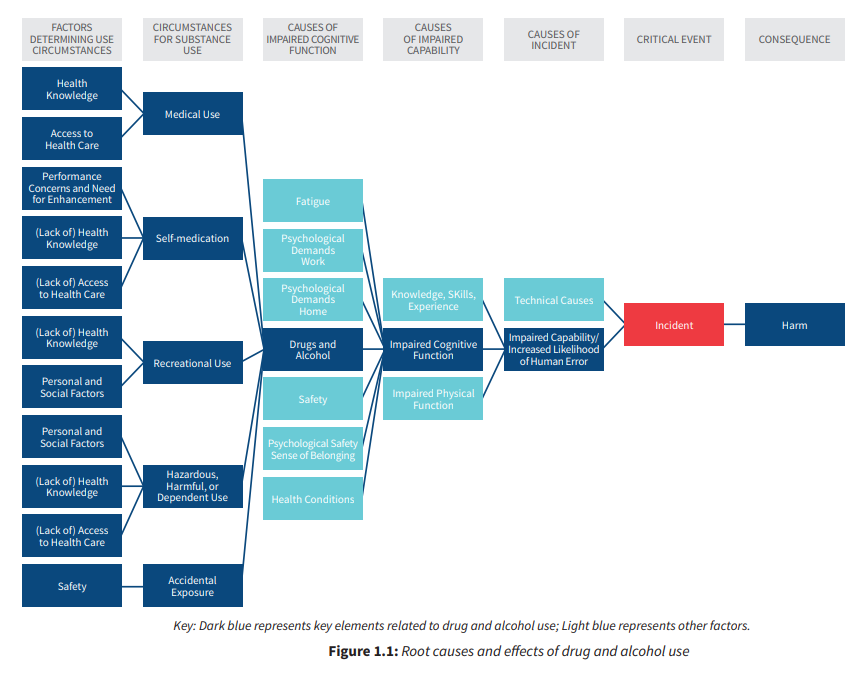The Oil Companies International Marine Forum (OCIMF) has published an updated information paper that provides guidance on how to manage the risks and potentially serious impacts associated with the use of drugs and alcohol in relation to marine operations.
The updated publication, Guidelines for the Control of Drugs and Alcohol in the Maritime Industry (2024), aims to provide general guidance and recommendations for the maritime industry (operators of tankers, barges, offshore vessels and terminals associated with the ship-shore interface) in developing and implementing controls for the use of drugs and alcohol.
As Jacob Damgaard, Associate Director, Loss Prevention, Britannia P&I Club, had explained, drug and alcohol abuse is a serious problem that can have significant consequences for the safety of the crew, the vessel and the environment. Whilst the shipping industry has recognised this, and taken steps to address it, incidents still occur. To further address this issue, there needs to be a greater focus on prevention. This includes increasing awareness of the dangers of drug and alcohol abuse among seafarers, providing education and training and promoting a culture of drug and alcohol-free work environments
In the guidelines, drug and alcohol use includes the use of prescribed and over-the-counter medication, self-medication, recreational drug or alcohol use, drug or alcohol dependency, and accidental exposure to drugs or alcohol.
The information paper covers workplace testing but does not address testing associated with treating and recovering identified substance dependency cases or return-to-work testing.
- Impaired judgment: Drugs and alcohol impair cognitive functions and coordination, which are crucial for safe operation of a ship and response to emergencies.
- Enhanced risk of accidents: Seafarers under the influence are more prone to accidents, both onboard and during port operations, endangering their own lives, the lives of their crewmates, and the environment.
- Decreased alertness: Substance abuse can lead to reduced alertness, attention, and concentration, affecting a seafarer’s ability to monitor the ship’s systems effectively.
- Health issues: Long-term substance abuse can lead to serious health problems like liver damage, cardiovascular issues, mental health disorders, and addiction.
- Conflict and misbehavior: Substance abuse can contribute to conflicts with fellow crew members, insubordination, and other forms of misconduct, which disrupt the ship’s operations and crew morale.
Furthermore, when designing a policy and procedures in relation to the control of drugs and alcohol, OCIMF advises that legal and other medical professional advice should be sought on the specific circumstances, including a review of legal authority in the country or jurisdiction where workplace drug and/or alcohol testing may take place.

The reasons behind substance use can be complicated. To address this issue, OCIMF places great importance on having a well-defined drug and alcohol policy encompassing preventive and supportive measures, a testing programme and disciplinary actions. It is crucial to foster an environment where individuals feel supported and comfortable seeking help to manage this risk effectively.
… said Saurabh Sachdeva, Publications and Advocacy Director, OCIMF
These guidelines replace OCIMF’s Guidelines for the Control of Drugs and Alcohol Onboard Ship (1995). The scope of the updated guidelines has been expanded to cover ships, barges, terminals and the offshore industry and includes new information on sampling and testing methods.
Details of substances to be tested are included and a human factors lens has been applied throughout the document.
































































OCIMF’s papers are known for their deep research and detailed analyses. However, my opinion is that we have come to a situation that we need to rethink on the fundamentals of alcohol use – and not substances use- for recreation purposes. Working on board is hard for seafarers, and its becoming harder. For the name of Safety and Wellbeing we are trying to protect our Seafarers, but for many cultures on this planet, controlled and structured alcohol use is connected with happiness, joy, celebration, companionship, work stress release etc etc. However, the paper does not recognise at all these aspects and instead claims that “A prevailing culture, which tolerates, for example, recreational substances use, may normalise the risks and associated behaviours.” Moreover, there is not a single reference on control consumption, apart from a paragraph indicating that policy needs to make clear when use of substances are allowed. Do they mean morphine or other strong painkillers in case there is a serious injury on board and the vessel not close to land or within range of rescue team? People on board are working and living on the same environment. When someone is out of duty, they must be eligible to spend their time as they wish, over a glass of wine or beer. When there is control over alcohol use and not total ban of alcohol, we make people happy. OCIMF in this case is focusing on strict barriers to identify personnel unfit for duty and prevent accidents, which is fully acceptable. On the other hand, there is no option or guidance how to allow controlled consumption of alcohol, indicating lack of empathy, despite claiming the contruary by stating “Effective management of drug and alcohol use is best focused on prevention. When people are working and living for 4,6,9 months on a ship with tough and sometimes irregular work schedule, exposed to weather, away from family and friends, and often doing a dangerous and/or monotry task, one may accept that there should be eligible for some release, in accordance with Safety rules and Culture. In essence, we are dealing with another corporate paper focusing on strict and detailed prevention barriers, however, ignoring human needs and feelings.